Scream star Melissa Barrera hit the headlines last week when she lost her role over comments she made supporting the Palestinian perspective: "Western media only shows...the other side," one read. Susan Sarandon was dropped by her talent agency CAA for comments she made at a pro-Palestinian rally against the ongoing genocide. Initially, some Jewish industry figures felt their peers were being too cautious. But now outspoken solidarity is having grave consequences, from demotions to firings challenging the American art scene. European artists have not been immune to the atmosphere of war that has gripped creative scenes around the world. Two major art events in Europe have faced controversy and resignations in the past month as they grapple with the situation in the Middle East, highlighting the challenges war poses to cultural institutions. In Germany, Documenta - one of the world's most prestigious contemporary art exhibitions, held every five years in Kassel - has come under fire for criticising an academic on its selection committee after he previously signed a pro-Palestinian letter.
The selection committee of Documenta resigns
Ranjit Hoskote, from India, is said to have endorsed a comparison between Hindu nationalism and Zionism in the 2019 letter from an Indian offshoot of the Boycott, Divestment and Sanctions (BDS) movement. Documenta's move was denounced as unfair by Hoskote, who resigned, claiming he could no longer participate in the "toxic atmosphere". Hoskoté's resignation came after German culture minister Claudia Roth denounced the letter as anti-Semitic. Another committee member, Israeli artist Bracha Ettinger, also resigned, citing the "dark times" in her home country, making engaging difficult. A few days later the entire selection committee for Documenta 16 resigned en masse, leaving the future of the 2027 edition in doubt. In their resignation letter, the remaining four members cited "grave concern for the future of Documenta" and questioned whether the appropriate conditions exist in Germany for diverse artistic perspectives.
Essen
The Museum Folkwang in Essen, Germany, has also decided to cancel the Afrofuturism chapter of its upcoming exhibition “We is Future”. Visions of New Communities, curated by Anaïs Duplan and his Studio AGD team, due to Duplan's pro-Palestinian Instagram posts.
Basel
In Switzerland, the newly appointed director of the Kunsthalle Basel, Mohamed Almusibli, has faced an angry backlash simply for signing online calls for a ceasefire. His defenders denounce 'openly racist' attacks. Among those facing workplace sanctions for their comments is Turkish pianist Fazil Say, whose gig was cancelled after he published a tweet about the war in Gaza.
Amsterdam
Meanwhile, in the Netherlands, the International Documentary Film Festival Amsterdam (IDFA) was criticised for appearing to censor pro-Palestinian slogans. After activists unfurled a banner calling for 'freedom from river to sea' at the festival's opening, the festival's director distanced himself - before rowing back with a conciliatory statement highlighting a range of perspectives. The incidents led to resignations and film withdrawals, as Palestinian artists accused the IDFA of pandering to "unfounded accusations of anti-Semitism".
London
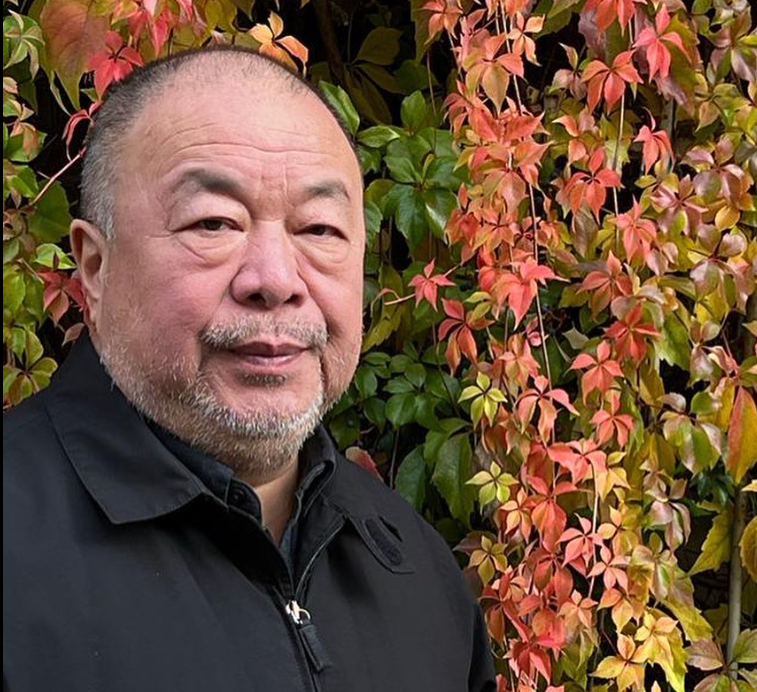 Lisson Gallery in London cancelled an upcoming solo exhibition by Chinese dissident artist Ai Weiwei in response to a tweet he posted criticizing Israel's actions during the recent conflict with Hamas in Gaza. Ai Weiwei had tweeted that Israel's actions were "evil" and accused it of war crimes. This sparked backlash. The Lisson Gallery decided to pull the exhibition, scheduled for February 2023, citing Ai's comments and their impact on staff well-being and security concerns. Ai criticized the gallery's decision as censorship and an attack on free expression.
Lisson Gallery in London cancelled an upcoming solo exhibition by Chinese dissident artist Ai Weiwei in response to a tweet he posted criticizing Israel's actions during the recent conflict with Hamas in Gaza. Ai Weiwei had tweeted that Israel's actions were "evil" and accused it of war crimes. This sparked backlash. The Lisson Gallery decided to pull the exhibition, scheduled for February 2023, citing Ai's comments and their impact on staff well-being and security concerns. Ai criticized the gallery's decision as censorship and an attack on free expression.
Venice
The Palestine Museum US's proposal to feature a Collateral Event exhibit comprising artwork by 23 Palestinian artists in the upcoming Biennale Arte 2024, titled "Foreigners in Their Homeland", has been declined by the Venice Biennale. The exhibit aimed to draw attention to the challenging living circumstances in areas under Israeli occupation, including Gaza. In an online petition for the Biennale to reconsider its decision, the Director of the Museum, Faisal Saleh, states that the decision made by one of the most esteemed cultural organisations worldwide not only stifles the voices of these artists but also reinforces a biased interpretation of the Israel-Palestine relationship.
Berlin
In Berlin, indie band Shopping and musician Richard Dawson pulled out of the Pop-Kultur festival after learning that the Israeli embassy had provided funding for some of the performers' travel. Both cited a boycott call by the Palestinian Campaign for Academic and Cultural Boycott of Israel (PACBI), known for urging artists not to work with Israeli state institutions. Pop-Kultur acknowledged the embassy's €1,200 support for three acts, but said the inclusion of Israeli musicians followed "standard cultural exchange". However, Dawson responded that he could not condone the event in any way following Israel's recent killing of Palestinians in Gaza. Critics argue that such state partnerships allow Israel to distract from its occupation policies through 'sportswashing'.
Reactions from the Israeli community
The reaction came from Israel’s Cultural institutions. Over 50 directors of major art museums in Israel signed an open letter addressed to international colleagues. In the letter, they condemn Hamas rocket attacks on Israeli cities and call on others in the international arts community to do the same. They criticize what they see as a lack of condemnation from arts institutions abroad regarding Hamas' actions. The magazine Erev Rav from Israel has released a letter signed by more than 2,400 individuals, criticising Artforum's open letter for neglecting to acknowledge and condemn Hamas' actions. The letter states that by disregarding the "atrocious killings" carried out by Hamas, the open letter is diminishing the value of the existence of the 9 million Israeli population. Artforum released a response to the letter dated October 19th that criticised "the open letter for its one-sided view."
Murals, posters and marches for peace
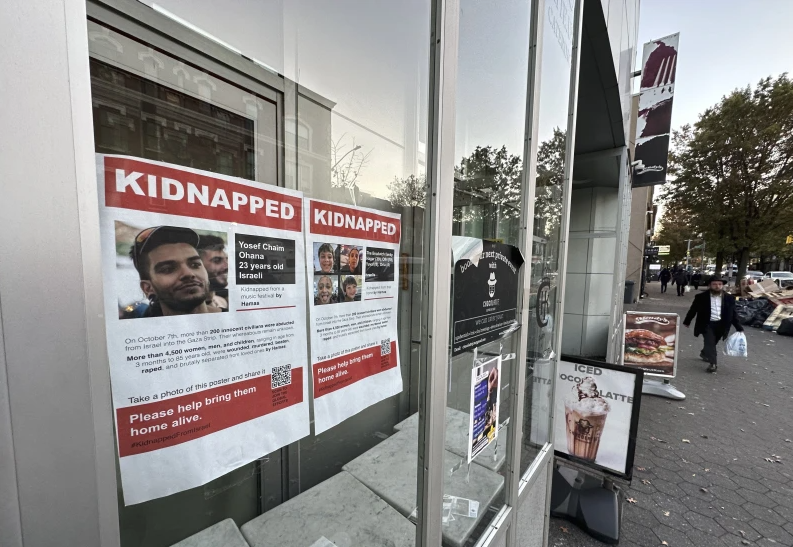
During the first days, a wave of support for the victims of Hamas’s attack came from artists like U2, stars like Ciara, Regina Spektor, Diddy, James Maslow, Gracie Abrams and others. Katy Perry shared a UNICEF post about the need for peace for children in Israel and Palestine. Madonna wrote that "conflicts can never be resolved with violence" and expressed support for Israel.
Hundreds of French artists led a silent march through central Paris calling for peace between Israelis and Palestinians. The performers included well-known actors such as Isabelle Adjani and Emmanuelle Beart, singers, and other cultural figures. They carried olive branches and white banners during the march. The march's organiser, Nadia Fares, said the silence was meant to balance the "cacophony" around the world regarding the Israeli-Palestinian conflict. France has significant Jewish and Muslim populations and has seen protests and tensions over the recent war between Israel and Hamas.
In Rome, street artist duo LeDiesis created a new graffiti artwork depicting two girls embracing, each with an Israeli or Palestinian flag on their back, as a message of love beyond division. Norwegian artist AFK painted flowers in Bergen with skulls and barbed wire to comment on the toll of war rather than take sides - an increasingly difficult position for most artists or organisations to take.
A Change of heart and the movement for a ceasefire
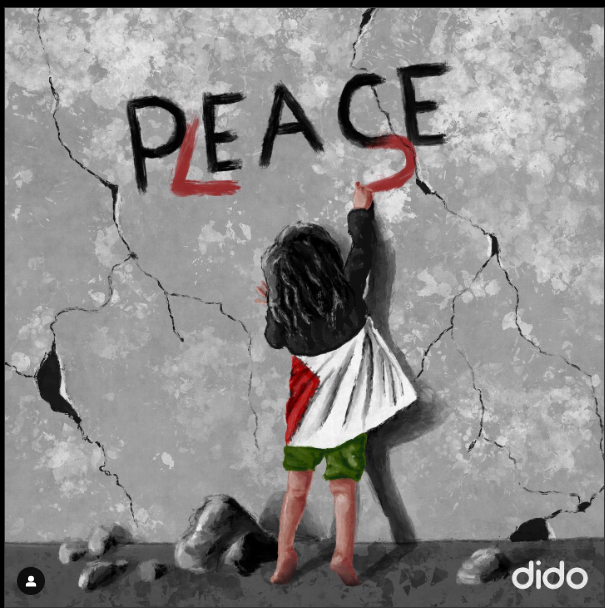
The changing atmosphere is indicative of the heated debate that is capturing the art scene worldwide: Whereas the October 7th attack mobilised artists against violence and war, the continuing bombing of Gaza and the fragile ceasefire are bringing about a cry out for Palestinian victims. As Europeans call for peace, Palestinian artists use the arts to spread a message of freedom that resonates more and more with the Art world as the war continues.
Led by the Musicians for Palestine group, over 4,000 musicians have backed calls for an end to hostilities in a joint letter. Industry heavyweights like Rage Against The Machine's Zack de la Rocha, Pulp's Jarvis Cocker and others have lent their names to the effort. The open letter is calling for a humanitarian ceasefire in Gaza and an end to the Israeli blockade.
In a similar initiative, over 150 renowned artists have donated photographs to a powerful charity print fundraising campaign. Pictures for Palestine, organised by Medical Aid for Palestinians, features works by luminaries such as Cindy Sherman, Yorgos Lanthimos and Turner Prize winner Jeremy Deller. Other notable contributors include David Gaberle, Tim Walker and photographer Steve Harries, whose portraits and landscapes populate the extensive list.
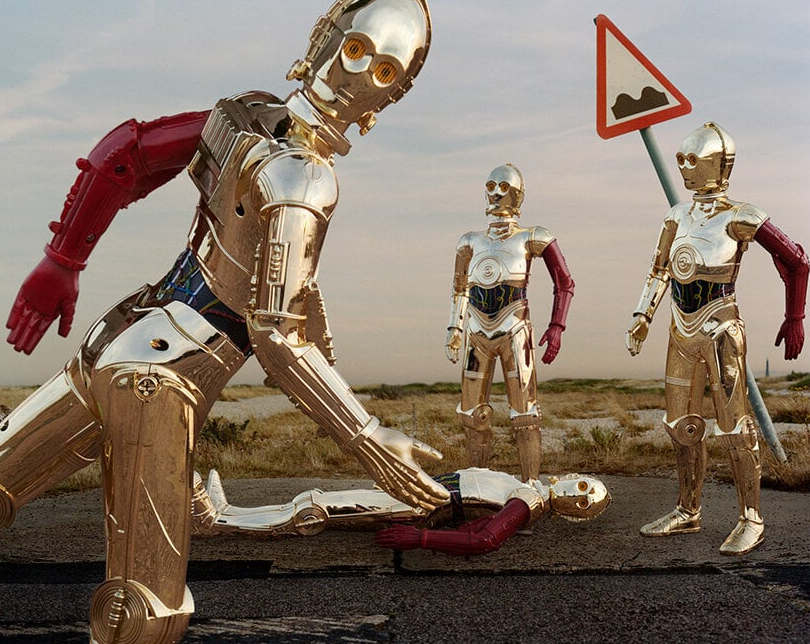 Last month 1,000 artists signed an open letter launched by Artists for Palestine UK demanding "an end to the unprecedented cruelty being inflicted on Gaza". Signatories include high-profile figures such as Steve McQueen, Roger Waters, Miriam Margolyes and Maxine Peake. It states that the bombardment of Gaza amounts to "disproportionate force and collective punishment" of civilians. The letter has sparked some backlash online, with critics accusing signatories of anti-Semitism or failing to acknowledge Hamas' rocket attacks on Israel.
Last month 1,000 artists signed an open letter launched by Artists for Palestine UK demanding "an end to the unprecedented cruelty being inflicted on Gaza". Signatories include high-profile figures such as Steve McQueen, Roger Waters, Miriam Margolyes and Maxine Peake. It states that the bombardment of Gaza amounts to "disproportionate force and collective punishment" of civilians. The letter has sparked some backlash online, with critics accusing signatories of anti-Semitism or failing to acknowledge Hamas' rocket attacks on Israel.
Last but not least, Art Forum's editor-in-chief, David Velasco, was fired last month for not following standard editorial procedures, after publishing an open letter calling for a ceasefire in Gaza. In a letter that followed a series of resignations, the staff expressed shock, confusion and anger at these events stating that it was committed to defending political expression and editorial freedom








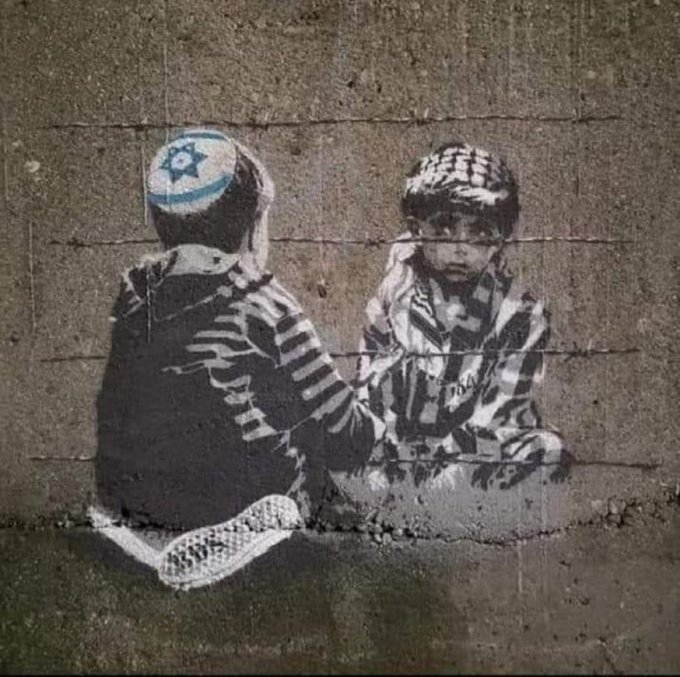
 Lisson Gallery in London
Lisson Gallery in London 

 Last month
Last month